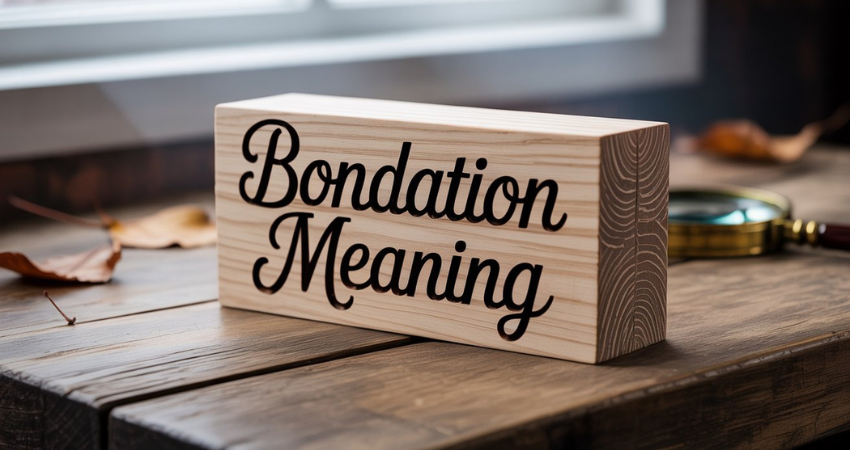“Bondation meaning” is a word you may have stumbled upon online or heard in random conversations — but what does it really mean? Well, the truth is, it doesn’t officially exist in standard English dictionaries. Still, that hasn’t stopped people from using it in different ways. It seems to be one of those made-up, yet catchy terms that social media has made popular.
Is “Bondation” a Real Word?
Technically, no. “bondation meaning” isn’t found in Oxford, Merriam-Webster, or other reputable dictionaries. But that doesn’t mean it lacks meaning. Language evolves, and this might just be one of those new-age, informal words shaped by the internet generation.
Where Did It Come From?
The term seems to be a mix-up or blend of other words like:
-
Bond + Foundation (suggesting a strong base in relationships)
-
Bondage (confusing or playful misspelling)
-
Or even a totally made-up slang word from social media
Online Usage and Urban Definitions
If you look on Urban Dictionary or Reddit, you’ll see multiple interpretations:
-
“An emotional bond so strong, it’s like a foundation.”
-
“The act of forming deep, unbreakable connections.”
-
“A typo of bondage.”
That’s the tricky part — it has no consistent meaning. But that’s also why it fascinates people.

Meaning 1: A Blend of “Bond” and “Foundation”
Some users interpret bondation as a positive, wholesome word — a deep emotional connection that acts as a foundation for relationships. Think of:
-
Family bonds
-
Lifelong friendships
-
Soulmate connections
This interpretation turns bondation into a beautiful concept — like emotional cement.
Meaning 2: A Misspelling of “Bondage”
Here’s where things get awkward. Many people accidentally use “bondation” when they actually mean bondage — a term often linked with consensual restraint in adult relationships.
So context matters a lot here. If you saw this term on TikTok with leather and chains in the background, now you know what they meant to say.
Meaning 3: Emotional or Psychological Bond
In a more poetic sense, some people use “bondation” to describe a deep psychological or emotional tie between two individuals. Like:
“Our bondation was unbreakable even when miles apart.”
Sounds romantic, right? That’s the beauty of made-up words — you can give them depth.
Bondation vs. Bondage: Know the Difference
| Aspect | Bondation | Bondage |
|---|---|---|
| Usage | Informal/Slang | Formal (Psychological/Sexual contexts) |
| Meaning | Emotional bond or connection | Physical or symbolic restraint |
| Recognition | Not in dictionaries | Officially recognized |
Psychological Interpretations
In psychology, the closest match would be attachment theory — how we form emotional connections. While “bondation” isn’t a clinical term, it reflects ideas about:
-
Emotional dependency
-
Secure attachment
-
Trust and loyalty
Neologisms and Language Evolution
Words like “bondation” are called neologisms — newly coined terms. Think of how words like:
-
“Selfie”
-
“Ghosting”
-
“Flex”
…all started informally and are now in dictionaries. “Bondation” might be on the same path.
TikTok, Memes, and the Viral Effect
Social media is a powerhouse in making fake words real. If someone says “bondation” in a viral video, suddenly everyone is using it — even if they don’t know what it means.
Fiction and Creative Writing
In storytelling or poetry, writers might use “bondation” as a symbolic term. It could describe:
-
A magical link between characters
-
The strength of a hero’s relationship
-
Emotional struggle or freedom
It adds flair and flavor, even if it’s not technically “correct.”
Relationships: Love, Dating, and More
Some use it to describe relationship depth. For example:
“Our bondation meaninggrew stronger through every argument.”
In this sense, it’s kind of cute — a word that captures something deeper than just “bond.”
Misconceptions and Misuse
Let’s be real — a lot of people use “bondation meaning” thinking it’s another word for “bondage.” This has led to:
-
Miscommunications
-
Embarrassing posts
-
Unintended meanings in DMs
What Linguists Think
Language experts often see such words as part of the natural evolution of human speech. It’s creative, it’s fluid, and it reflects how we play with language in the digital age.
Some may cringe, but others see beauty in it.
Better Alternatives to Use
If you’re not feeling bold enough to use “bondation meaning,” try these:
-
Emotional bond
-
Deep connection
-
Foundational relationship
-
Attachment
They get the point across and won’t raise eyebrows in formal settings.

When and Where Should You Use It?
Use It:
-
In poetry
-
On social media
-
In casual conversations
Avoid It:
-
In resumes
-
Academic writing
-
Legal documents
Future of the Word
Who knows? “Bondation” might make it to the dictionary if enough people use it consistently. All it takes is cultural momentum and common usage.
Conclusion
“Bondation meaning” might not be a real word — but it feels real to many people. Whether you use it to describe love, connection, or just for fun, it shows how creative and emotional language can be. It might never be official, but that doesn’t mean it doesn’t matter.
FAQs
1. What does “Bondation” mean in a relationship?
It often refers to a deep emotional or psychological bond, like a strong connection or foundation in a relationship.
2. Is “Bondation” the same as “Bondage”?
No. “Bondation” is usually a mistaken or playful form, while “bondage” refers to restraint, often in physical or psychological contexts.
3. Can I use “Bondation” in professional writing?
No. It’s best kept to informal or creative writing. Stick to officially recognized terms in professional settings.
4. Why is “Bondation” popular online?
Social media, memes, and viral culture have made it trendy — even without a fixed meaning.
5. Are there official definitions of “Bondation”?
Not in standard dictionaries. Most meanings come from Urban Dictionary or user interpretations online.
